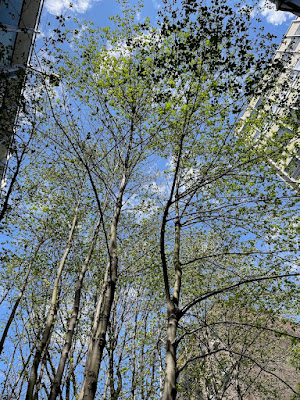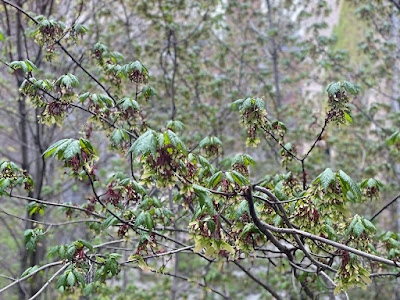Sunday, April 30, 2023
GPT dreams
Saturday, April 29, 2023
Sylvan collage

We're back in the 'Dacks, just as spring starts to poke through a forerst floor plastered with sodden leaves like old newspaper clippings.
Friday, April 28, 2023
Thursday, April 27, 2023
Gaswéñdah
Tuesday, April 25, 2023
Blue marble
Monday, April 24, 2023
Sunday, April 23, 2023
'Sup at Emmaus
The gospel reading for today - Easter 3 - was the familiar story of the road to Emmaus. Two disconsolate disciples leave Jerusalem and meet someone on the road, who asks “What are you discussing with each other while you walk along?” “Are you the only stranger in Jerusalem who does not know the things that have taken place there in these days?” one replies, and tells of the execution of Jesus of Nazareth, whom they had thought was "the one to redeem Israel." Still, some women had claimed that his tomb was empty... The stranger responds “Oh, how foolish you are, and how slow of heart to believe all that the prophets have declared! Was it not necessary that the Messiah should suffer these things and then enter into his glory?” He goes on to interpret the scriptures explaining why this should be so.
As they came near the village to which they were going, he walked ahead as if he were going on. But they urged him strongly, saying, “Stay with us, because it is almost evening and the day is now nearly over.”
So they sit down over food, and as he breaks bread they recognize him - and he vanishes. “Were not our hearts burning within us while he was talking to us on the road," they say to each other, "while he was opening the scriptures to us?” and return to Jerusalem to report whom they had seen, which is why Luke, telling the story, lets us in on it from the start: "Jesus himself came near and went with them, but their eyes were kept from recognizing him." That somewhat spoils the surprise, but presumably that's how they reported it too, "we met Jesus!" rather than "we met someone who turned out to be him."
It's a great story, and has produced remarkable art juggling these points of view, the moment when, in the blessing and breaking of the bread, the disciples see Jesus - just before he vanishes again from their view. (Or perhaps a servant woman recognizes him before they do.) But hearing the story again today I was caught by the words from earlier in the story. “Stay with us, because it is almost evening and the day is now nearly over.” Years ago, perhaps even before the fall of the wall, I was in Berlin and was struck by the words inscribed over the door of a Protestant church, words I remember as "verweil mit uns, denn es will dunkel werden." Along the way I must have worked out where these words came from but I don't think I quite worked out that they are addressed to Jesus but unawares. The disciples' hearts are burning and they have heard of the empty tomb, but cannot yet believe. The person they invite to stay with them is, so far as they can at that point imagine, just another person, though one whose reading of the scriptures gives them hope, a solitary traveler they invite into their company. Their words from just before they understood, not Luke's - or Jesus'. Human, profound.
Friday, April 21, 2023
Thursday, April 20, 2023
Snitowana
Holding History
We’ve been working on the history of this marvelous and maddening school for close to a decade, and Ann’s been one of our most important muses. We’ve met with her over many years, talking informally and formally. She is this history – she came to Lang in its very early days; she critiques this history – she has been instrumental in telling the comings and goings of Gender Studies; and she keeps this history alive – she has saved documents, flyers, and tales. Ann has helped us appreciate that The New School has always been a site for struggle and has modeled for us – as activist, scholar, colleague – how one might continue to love this imperfect institution. She holds us and our history in a warm, though mindful, embrace.
One of Ann’s projects that has served as a guide for us is the Feminist Memoir Project, a project undertaken with Rachel Blau DuPlessis in response to the discovery – disturbing but perhaps not surprising – that the women’s movement hardly appeared in emerging histories of the Sixties. It’s a wonderful volume, taking you deep into many moments of the women’s movement, its vantages and questions as varied and compelling as the women featured. Now these women’s voices were there for all to hear! But, ten years later, the pattern had barely changed.
What especially inspires us is what Ann did next. She wrote an essay admitting that Feminist Memoir Project hadn’t changed the prevailing narrative, and owning the anger and disappointment this realization provoked. Then she sought a deeper understanding of the phenomenon and arrived at a way to continue the struggle.
Ann’s deeper understanding took the form of acknowledging that women’s histories – at least the histories of the women’s movement – are structurally hard to remember. She utilizes Bill Hirst’s work on what kinds of memories are “sticky” and establishes that the women’s histories in question simply aren’t. They don’t tell a clear story, with a clear end, a unified voice, a charismatic spokesperson. Charismatic speakers were many, but none wanted to be a spokesperson. And the movement’s messages were many – as many as you would need for a movement whose goal was not some definable end state but the blossoming of as many kinds of lives as empowered liberated women might seek to live. Sticky political movements walk in lockstep, but not movements of liberation.
What to do about this? Ann names the temptation to learn to throw like a boy, and resists it. Something more than superficial would be lost if a movement like the women’s movement disciplined itself into sticky behaviors. The cacophony of voices of the women’s movement doesn’t represent a loss of focus. It’s not just a phase. It’s what liberation looks like. How can this abundance be held for future generations to discover?
This leads to a chastened sense of what historians can do. Many of the stories they want to tell aren’t sticky, and will likely be overlooked, simplified, bowdlerized. The struggle goes on. Our work on New School history tries to capture and convey a kindred cacophony, knowing we’ll always be out-shouted by tall men with catchy slogans. And in our documentary work we seek to produce an archive for those who come new to the struggle, to show them what liberated lives, lives owning the challenges and ambiguities – the uncertainties – look like.
Our approach to New School histories – polyvocal, collaborative, open-ended, and staving off pressure to “write the book” – is nurtured by these ideas and by Ann’s splendid example.
Wednesday, April 19, 2023
Sweet!
Tuesday, April 18, 2023
Boogie-woogie tree
 Can't resist sharing this work by Piet Mondrian, "Avond," aka "The Red Tree," painted in 1908, just before his work started going abstract. What if the energies coursing (like the colors) through his famous "Broadway Boogie-woogie" (1942-3) at MoMA are actually arboreal?!
Can't resist sharing this work by Piet Mondrian, "Avond," aka "The Red Tree," painted in 1908, just before his work started going abstract. What if the energies coursing (like the colors) through his famous "Broadway Boogie-woogie" (1942-3) at MoMA are actually arboreal?!
Friday, April 14, 2023
Thursday, April 13, 2023
Wednesday, April 12, 2023
Monday, April 10, 2023
Sunday, April 09, 2023
さくら? もみじ!
Saturday, April 08, 2023
Uplifted
Friday, April 07, 2023
Wood Friday
Wednesday, April 05, 2023
Samara segue
The Lang courtyard maples, sparkling red for two months, now look brownish from a distance but like this up close, as we segue to green.
Unto the seventh paragraph
When Rabbi Israel Baal Shem Tov, the founder of Hasidism, saw that the Jewish people were threatened by tragedy, he would go to a particular place in the forest where he lit a fire, recited a particular prayer, and asked for a miracle to save the Jews from the threat. Because of the Holy Fire and faithfulness of the prayer, the miracle was accomplished, averting the tragedy.
Later, when the Baal Shem Tov’s disciple, the Maggid of Mezrich, had to intervene with heaven for the same reason, he went to the same place in the forest where he told the Master of the Universe that while he did not know how to light the fire, he could still recite the prayer, and again, the miracle was accomplished.
Later still, Rabbi Moshe Leib of Sasov, in turn a disciple of the Maggid of Mezrich, went into the forest to save his people. “I do not know how to light the fire,” he pleaded with God, “and I do not know the prayer, but I can find the place and this must be sufficient.” Once again, the miracle was accomplished.
When it was the turn of Rabbi Israel of Rizhyn, the great grandson of the Maggid of Mezrichwho, who was named after the Baal Shem Tov, to avert the threat, he sat in his armchair, holding his head in his hands, and said to God: “I am unable to light the fire, I do not know the prayer, and I cannot even find the place in the forest. All I can do is to tell the story. That must be enough.”

.jpeg)












































